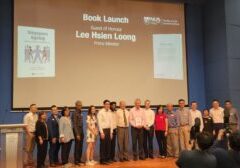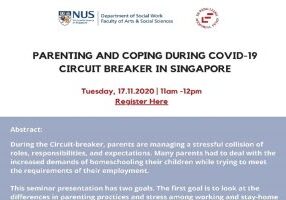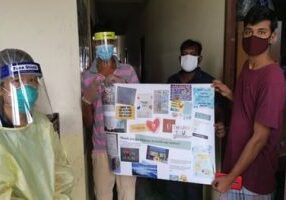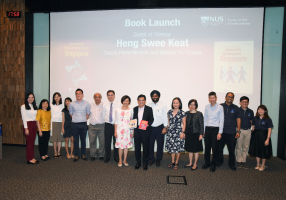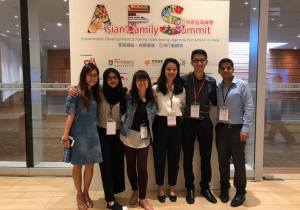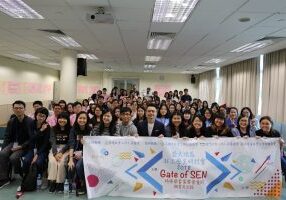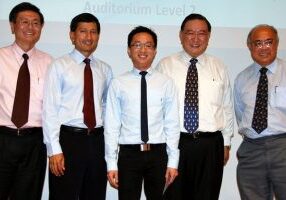Webinar on “Providing Psychological and Practical Support for both healthcare workers and migrant workers in pandemic situation”
August 27, 2020

The webinar was conducted by Ms Ong Bee Yong from Crisis Relief Alliance who is our EPLMF scholarship recipient, and the session was moderated by Dr S Vasoo from NUS Department of Social Work. Below is a write up of her work during the Covid-19 outbreak.
Crisis Relief Alliance (CRA)
Covid-19 hit us all on many fronts and stretched our resources in ways that we have not imagined since late January 2020, in particular with the implementation of a nation-wide Circuit Breaker from 7 April to 1 June 2020. Whether it’s work, studies, family, friends …
Since March 2020, CRA has stepped up to meet the bio-psycho-social needs of frontline workers including healthcare workers and dormitory staff, and foreign workers in the dormitories combating Covid-19.
As a member of the Board of Director of Crisis Relief Alliance and the Project Director of CRA Counselling Service I have the privilege to serve with many medical, social work and supplies distribution volunteers, and be part of the lives of our Frontline Workers and Migrant Workers during this difficult time.
Hotline for Healthcare workers
CRA started this hotline with a team of 10 experienced social workers and counsellors in March 2020. The aim of this hotline was to provide a listening ear and counselling to healthcare workers (HCWs) who are in the forefront fighting this virus-fire. The higher level of stress and heightened anxiety, neglect of personal self-care and prolonged duration of maintaining high vigilance at work are risk factors for depression.
In the coming month, this hotline will be extended to foreign workers living in dormitories feeling vulnerable to Covid-19 and concerned for their livelihood.
Needs Assessment and Survey Teams & Crisis Management Team
By 10 April 2020, CRA started serving as a community partner of the Ministry of Manpower. To date it is helping to assess the needs of about 10,000 foreign workers in about 80 smaller factory-converted-dormitories (FCD). To cope with the increasing workload, we had to recruit and equip more volunteers, with a ten-fold increase over one month.
The Needs Assessment and Survey Team (NAST) and Crisis Management teams comprising of medical professionals visit the dormitories in full PPE and assess needs according to a standardised form that we have created. In crisis situations with new Covid-cases and critical incidence situations, Crisis Management Team will enter the dormitories to dialogue with the dormitory managers and foreign workers and critical incident reports with our recommendations are usually made to MOM within 24-hr.
The physical and psycho-social health of the foreign workers are evaluated regularly.
Supply of fruits and other essentials to the Dormitories under our care
Our supplies distribution team of more than 100 non-medical volunteers make weekly deliveries of fruits, supplementary food items, masks, sanitizers, and personal protective equipment to the dormitories who are receptive to our assistance. The main bulk of our distribution are fruits because we believe that a balanced diet will boost the immunity of the foreign workers and probably put them in a better stead to fight against Covid-19.
Morale and Psychological booster during the shut-in period for foreign workers
CRA brought festive cheer to the foreign workers by gifting new clothes, festive snacks like dates during Ramadan period and on Hari Raya Puasa. It was a joyous time for the workers who were pleasantly surprised that regardless of religious affiliations, they received new clothes and gifts of food.
4 schools have partnered CRA to encourage their students to make cards during the Home-based learning month. Some 800 cards were received, compiled and made into waterproof posters and were distributed to dormitories, community-care facilities and through social media. Heartfelt words, such as these below were but a few of many hundreds of cards received and re-printed for distribution.
“Dear uncles, thank you for building our homes. We hope that you will recover soon and quickly. Thank you for your hard work. I am grateful for the house I am living in.”
“Thank you for helping Singapore and get well soon!! :))”
“Thank you for making Singapore great. All the sacrifices you have made is so courageous. You have left your home to make ours better. Thank you.”
“It is such a misfortune that Singapore has a spike of cases involving you, but hang in there, we can get through this!”
Conclusion
We believe that it is important to support our frontline workers including healthcare workers and dormitories staff during this crisis. We also have initiatives which we believe would provide practical help to build a sense of community for the foreign workers in Singapore who may feel isolated from their friends and families, mitigate health risks and help manage their feelings of anxiety.


